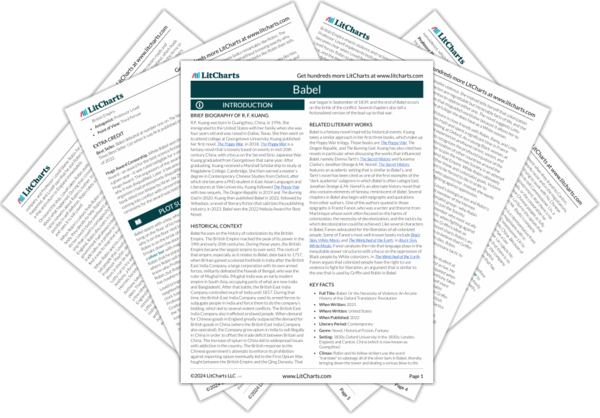Welcome to the LitCharts study guide on R. F. Kuang's Babel. Created by the original team behind SparkNotes, LitCharts are the world's best literature guides.
Babel: Introduction
Babel: Plot Summary
Babel: Detailed Summary & Analysis
Babel: Themes
Babel: Quotes
Babel: Characters
Babel: Symbols
Babel: Theme Wheel
Brief Biography of R. F. Kuang

Historical Context of Babel
Other Books Related to Babel
- Full Title: Babel: Or the Necessity of Violence: An Arcane History of the Oxford Translators’ Revolution
- When Written: 2021
- Where Written: United States
- When Published: 2022
- Literary Period: Contemporary
- Genre: Novel, Historical Fiction, Fantasy
- Setting: 1830s Oxford University in the 1830s; London, England; and Canton, China (which is now known as Guangzhou)
- Climax: Robin and his fellow strikers use the word “translate” to sabotage all of the silver bars in Babel, thereby bringing down the tower and dealing a serious blow to the British Empire.
- Antagonist: Professor Lovell
- Point of View: Third Person
Extra Credit for Babel
Best Seller. Babel debuted at number one on The New York Times Best Seller List when it was first published in September of 2022.
Hugo Award Censorship. While Babel won the Nebula Award—an award for the best science fiction or fantasy novel in a given year—it was ruled ineligible for a similar award, the Hugo Award. The organizers of the award gave no explanation why it was disqualified. Later, it became clear that the award organizers had preemptively disqualified Babel (and another book titled Iron Widow by Xiran Jay Zhao) to avoid potentially coming into conflict with censorship laws in China, where the ceremony for the award was held that year.







